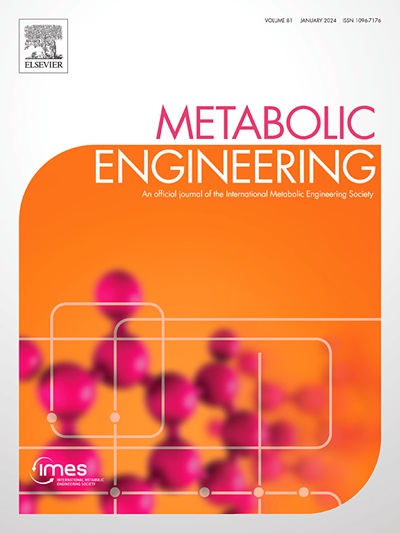Regulation of proenzyme activation and metabolic engineering for protein-glutaminase production in Bacillus subtilis
IF 6.8
1区 生物学
Q1 BIOTECHNOLOGY & APPLIED MICROBIOLOGY
引用次数: 0
Abstract
The protein-glutaminase (PG, EC 3.5.1.44) specifically targets glutamine residues in proteins and peptides, and has significant potential for enhancing the functional characteristics and processing efficiency of plant proteins. However, natural PG production faces challenges such as low enzymatic yield and difficult genetic manipulation. To address these challenges, a novel self-activating PG expression system was developed in Bacillus subtilis. First, pro-PG (PPG)-activated proteases were identified in B. subtilis by constructing a series of engineered strains. Second, the co-expression of PPG and PPG-activated protease in B. subtilis WB800 for mature PG (mPG) production was analyzed, and it was found that the supply and activation of PPG during fermentation was insufficient. Therefore, the gene expression components of PPG and protease, including the promoter and RBS, were further optimized. In addition, the key genes of the maltose metabolic pathway were knocked out, and the engineered strain W8ΔM2-AE-Pmal380 showed the highest capacity for PG production. Finally, a 53.0 U/mL mPG yield was achieved in a 5-L bioreactor within 64 h. This study establishes an efficient platform for industrial PG production and provides a reference for the expression and activation of other proenzymes.
枯草芽孢杆菌蛋白谷氨酰胺酶原活化调控及代谢工程研究。
蛋白-谷氨酰胺酶(protein-glutaminase, PG, EC 3.5.1.44)专门针对蛋白质和多肽中的谷氨酰胺残基,在提高植物蛋白的功能特性和加工效率方面具有重要的潜力。然而,天然PG的生产面临着酶产率低和基因操作困难等挑战。为了解决这些挑战,在枯草芽孢杆菌中开发了一种新的自激活PG表达系统。首先,通过构建一系列工程菌株,鉴定了枯草芽孢杆菌中原pg (PPG)活化的蛋白酶。其次,分析了枯草芽孢杆菌WB800中PPG和PPG活化蛋白酶的共表达情况,发现发酵过程中PPG的供应和活化不足。因此,进一步优化PPG和蛋白酶的基因表达组分,包括启动子和RBS。此外,麦芽糖代谢途径的关键基因被敲除,工程菌株W8ΔM2-AE-Pmal380显示出最高的PG生产能力。最终在5-L的生物反应器中,在64 h内获得了53.0 U/mL的mPG产率。本研究为工业生产PG建立了一个高效的平台,并为其他原酶的表达和激活提供了参考。
本文章由计算机程序翻译,如有差异,请以英文原文为准。
求助全文
约1分钟内获得全文
求助全文
来源期刊

Metabolic engineering
工程技术-生物工程与应用微生物
CiteScore
15.60
自引率
6.00%
发文量
140
审稿时长
44 days
期刊介绍:
Metabolic Engineering (MBE) is a journal that focuses on publishing original research papers on the directed modulation of metabolic pathways for metabolite overproduction or the enhancement of cellular properties. It welcomes papers that describe the engineering of native pathways and the synthesis of heterologous pathways to convert microorganisms into microbial cell factories. The journal covers experimental, computational, and modeling approaches for understanding metabolic pathways and manipulating them through genetic, media, or environmental means. Effective exploration of metabolic pathways necessitates the use of molecular biology and biochemistry methods, as well as engineering techniques for modeling and data analysis. MBE serves as a platform for interdisciplinary research in fields such as biochemistry, molecular biology, applied microbiology, cellular physiology, cellular nutrition in health and disease, and biochemical engineering. The journal publishes various types of papers, including original research papers and review papers. It is indexed and abstracted in databases such as Scopus, Embase, EMBiology, Current Contents - Life Sciences and Clinical Medicine, Science Citation Index, PubMed/Medline, CAS and Biotechnology Citation Index.
 求助内容:
求助内容: 应助结果提醒方式:
应助结果提醒方式:


